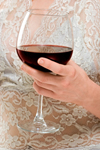 Indulgence in alcohol, even for some moderate drinkers, does carry the risk of hangover. The classic signs are a throbbing headache, queasy stomach, general weakness, and dry mouth. Dehydration (alcohol suppresses the anti-diuretic hormone), acetaldehyde buildup (a toxic substance produced in the body from alcohol), and probably the metabolism of methanol to formaldehyde and formic acid are what cause a hangover.
Indulgence in alcohol, even for some moderate drinkers, does carry the risk of hangover. The classic signs are a throbbing headache, queasy stomach, general weakness, and dry mouth. Dehydration (alcohol suppresses the anti-diuretic hormone), acetaldehyde buildup (a toxic substance produced in the body from alcohol), and probably the metabolism of methanol to formaldehyde and formic acid are what cause a hangover.
The big question is: what do you do once you have one? Many are also wondering what they can do to prevent one, other than by just avoiding alcohol altogether and drinking only virgin cocktails. Today, we’ll look at a few promising natural remedies or preventative tips.
A promising study from UCLA has identified a component in a Chinese herbal anti-hangover medicine that may help to thwart acute alcohol intoxication and dependence. At least one human study noted that, when taken before drinking, the substance could reduce circulating levels of alcohol. Dihydromyricetin, isolated from the plant Hovenia dulcis (Japanese raisin tree), blocks the effect of alcohol on the brain and neurons, reduces voluntary alcohol consumption, and counteracts acute alcohol (EtOH) intoxication.
In late 2008, the Korea Food & Drug Administration approved extracts of the Hovenia dulcis fruit to protect and help the liver recover from substances such as alcohol. The main chemical in Hovenia dulcis is the flavonoid quercetin, which has anti-inflammatory and antioxidant properties. Flavonoids are found in high amounts in vegetables and fruits.
A Japanese study showed that taking four to six grams of chlorella powder, a freshwater single-celled green algae thought to be a detoxifying agent, before consuming alcohol could prevent hangovers 96% of the time, even with heavy drinking.
Research suggests that popping a 1,000-mg vitamin B12 (cobalamin) tablet before you go out for the evening, or even after drinking and before bed, can help ward off a hangover. The water-soluble vitamin helps flush out the toxins in the alcohol and plays a key role in the normal functioning of the brain and nervous system. Many cleanses include B12. Dietary sources include meat, fish, dairy products, and eggs.
Potassium is a key dietary mineral that helps regulate water balance, heartbeat, and sodium levels in the body, all of which may be off when suffering from a hangover. Foods high in potassium include tomato paste (660 mg per 1/4 cup), prune juice (528 mg in six fluid ounces), bananas (400 mg in a medium-sized banana), and dark molasses (498 mg per teaspoon).
Make your morning smoothie a “hangover special” by adding a banana, some prune juice, and a little dark molasses. If a smoothie is too much, a few teaspoons of honey three times an hour can help because of the fructose content, which helps metabolize the alcohol.
Drinking on a full stomach slows the absorption of alcohol into the bloodstream, giving the body more opportunity to metabolize it successfully. Drinking lots of water before the evening begins, alternating a glass of water with every drink, and then quaffing three or four more glasses before going to sleep is a huge antidote to dehydration.
And finally, since the skin eliminates up to one-third of the body’s toxic matter, another way to help speed the removal of alcohol is to bathe in water with a spoonful of dissolved wasabi powder (Japanese horseradish) or dry mustard powder. The stimulating nature of the wasabi or the mustard powder increases circulation and helps draw out toxins.
Sources for Today’s Articles:
Natural Hangover Remedies Revealed
Calder, I., “Hangover: Not the Ethanol, Perhaps the Methanol,” British Medical Journal, January 4, 1997; 14: 2–3.
Yi Shen, A., et al., “Dihydromyricetin As a Novel Anti-Alcohol Intoxication Medication,” The Journal of Neuroscience, January 4, 2012; 32(1): 390–401; 10.1523/JNEUROSCI.4639-11.2012.
Choi, G.H., et al., “Protective Effects of Food Including Hovenia dulcis on Acute Alcohol Intoxication,” Journal of The Korean Society of Food Science and Nutrition August 2011.
Kanno, T., Chlorella Vulgaris, 232. Higdon, J., and Drake, V.J., Linus Pauling Institute Micronutrient Information Center, Oregon State University.
